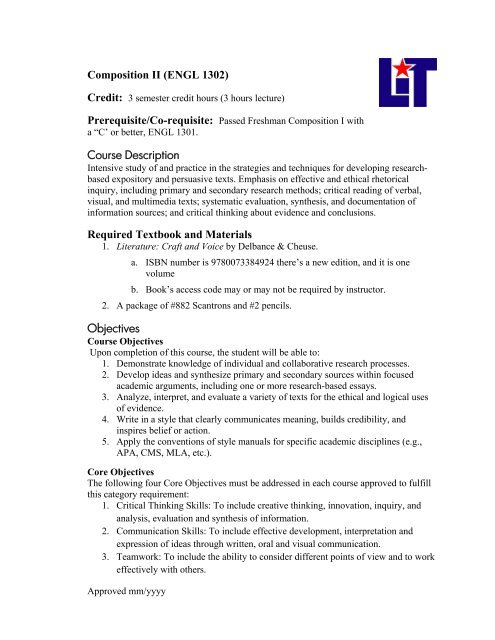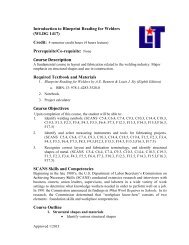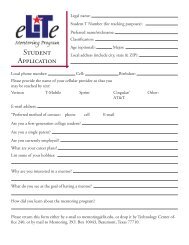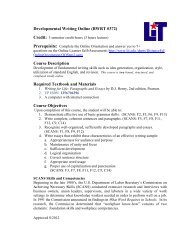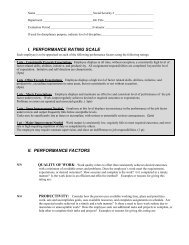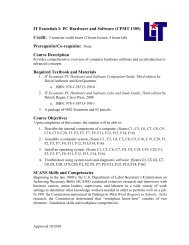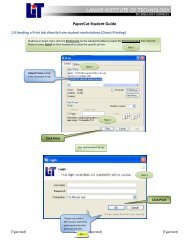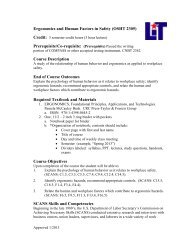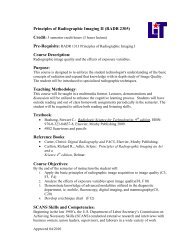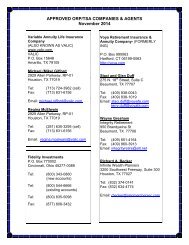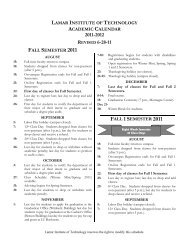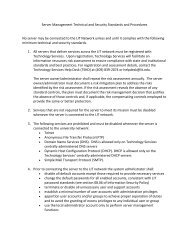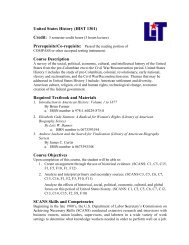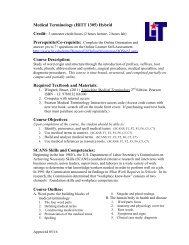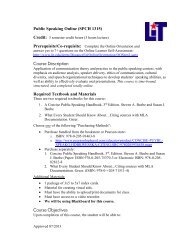Composition II (ENGL 1302) Course Description Required Textbook ...
Composition II (ENGL 1302) Course Description Required Textbook ...
Composition II (ENGL 1302) Course Description Required Textbook ...
Create successful ePaper yourself
Turn your PDF publications into a flip-book with our unique Google optimized e-Paper software.
<strong>Composition</strong> <strong>II</strong> (<strong>ENGL</strong> <strong>1302</strong>)Credit: 3 semester credit hours (3 hours lecture)Prerequisite/Co-requisite: Passed Freshman <strong>Composition</strong> I witha “C’ or better, <strong>ENGL</strong> 1301.<strong>Course</strong> <strong>Description</strong>Intensive study of and practice in the strategies and techniques for developing researchbasedexpository and persuasive texts. Emphasis on effective and ethical rhetoricalinquiry, including primary and secondary research methods; critical reading of verbal,visual, and multimedia texts; systematic evaluation, synthesis, and documentation ofinformation sources; and critical thinking about evidence and conclusions.<strong>Required</strong> <strong>Textbook</strong> and Materials1. Literature: Craft and Voice by Delbance & Cheuse.a. ISBN number is 9780073384924 there’s a new edition, and it is onevolumeb. Book’s access code may or may not be required by instructor.2. A package of #882 Scantrons and #2 pencils.Objectives<strong>Course</strong> ObjectivesUpon completion of this course, the student will be able to:1. Demonstrate knowledge of individual and collaborative research processes.2. Develop ideas and synthesize primary and secondary sources within focusedacademic arguments, including one or more research-based essays.3. Analyze, interpret, and evaluate a variety of texts for the ethical and logical usesof evidence.4. Write in a style that clearly communicates meaning, builds credibility, andinspires belief or action.5. Apply the conventions of style manuals for specific academic disciplines (e.g.,APA, CMS, MLA, etc.).Core ObjectivesThe following four Core Objectives must be addressed in each course approved to fulfillthis category requirement:1. Critical Thinking Skills: To include creative thinking, innovation, inquiry, andanalysis, evaluation and synthesis of information.2. Communication Skills: To include effective development, interpretation andexpression of ideas through written, oral and visual communication.3. Teamwork: To include the ability to consider different points of view and to workeffectively with others.Approved mm/yyyy
<strong>ENGL</strong> <strong>1302</strong><strong>Course</strong> Syllabus4. Personal Responsibility: To include the ability to connect choices, actions andconsequences to ethical decision-making.<strong>Course</strong> OutlineA. The Basics of the Literature1. Drama2. Poetry3. Fiction4. Critical Approaches to LiteratureB. Drama1. Reading and Viewing a Play in ItsElements2. Writing about Drama3. Ancient Greek Drama4. William Shakespeare5. Modern Drama6. Contemporary Theater7. Comparison and Contrast EssayC. Poetry1. Reading a Poem in Its Elements2. Writing about Poetry3. WordsGrade Scale90 – 100 A80 – 89 B70 – 79 C60 – 69 D0 – 59 F4. Voice: Tone, Persona, and Irony5. Imagery and Symbol6. Figures of Speech7. Sound, Rhyme, and Rhythm8. Fixed Poetic Forms9. Open Forms10. Song and Spoken WordD. Fiction1. Reading a Story for Its Elements2. Writing About Fiction3. Plot?4. Character5. Setting6. Point of View7. Language, Tone, and Style8. Theme9. Symbol<strong>Course</strong> EvaluationFinal grades will be calculated according to the following criteria:1. Essay #1 10%2. Essay #2 10%3. Essay #3 10%4. Research Project 25%5. Daily Grades 20%6. Final Examination 25%<strong>Course</strong> Requirements1. Three 400 – 600 word Essays.2. One 400 – 6000 word Research Essay.3. One graded grammar final exam.4. One graded essay final exam.2
<strong>ENGL</strong> <strong>1302</strong><strong>Course</strong> Syllabus<strong>Course</strong> Policies1. No food, drinks, or use of tobacco products in class.2. Beepers, telephones, headphones, and any other electronic devices must be turnedoff while in class.3. Do not bring children to class.4. No late assignments will be accepted.5. Tests. Students that miss a test are not allowed to make up the test. Students thatmiss a test will receive a grade of ‘0’.6. Attendance Policy. Two absences are allowed. If a student is tardy to class ordeparts early three (3) times, it will be equal to one (1) absence. Each absencebeyond two absences will result in a 5 point deduction from your final grade.7. If you wish to drop a course, the student is responsible for initiating andcompleting the drop process. If you stop coming to class and fail to drop thecourse, you will earn an ‘F’ in the course.8. Additional class policies as defined by the individual course instructor.Disabilities StatementThe Americans with Disabilities Act of 1992 and Section 504 of the Rehabilitation Act of1973 are federal anti-discrimination statutes that provide comprehensive civil rights forpersons with disabilities. Among other things, these statutes require that all students withdocumented disabilities be guaranteed a learning environment that provides forreasonable accommodations for their disabilities. If you believe you have a disabilityrequiring an accommodation, please contact the Special Populations Coordinator at (409)880-1737 or visit the office in Student Services, Cecil Beeson Building.<strong>Course</strong> ScheduleWeek Topic ReferenceOneIntroductionTwo Drama The Basics of the LiteraturePoetryFictionThree Drama The Basics of the literaturePoetryFourFictionCritical Approaches to LiteratureFive Reading and Viewing a Play in its Elements DramaPlot3
<strong>ENGL</strong> <strong>1302</strong><strong>Course</strong> SyllabusExpositionDialogueConflictRising ActionSix Climax DramaDenouementSubplotCharactersDramatis PersonaeSeven Protagonist DramaAntagonistStage directionsScriptSettingEight Reading a Poem in Its Elements PoetryWriting About PoetryWordsVoice: Tone, Persona, and IronyNine Imagery and Symbol PoetryFigures of SpeechSound, Rhyme, and RhythmTen Fixed Poetic Forms PoetryOpen FormsSong and Spoken WordEleven Reading a Story for Its Elements FictionWriting About FictionPlotCharacterTwelve Setting FictionPoint of ViewLanguage, Tone, and Style4
<strong>ENGL</strong> <strong>1302</strong><strong>Course</strong> SyllabusThirteen Theme FictionFourteenFifteenSixteenFinalExamSymbolResearch PaperResearch PaperGiven on the date and time specified by theofficial exam schedule5


